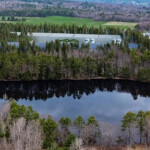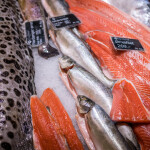The development of a fishing industry project in Sierra Leone finance by China is being opposed group of non-governmental organizations who claim it will harm the environment.
The Sierra Leone government said it has received USD 55 million (EUR 45 million) from China for the construction of a fishing harbor and fishmeal plant on 250 acres in the Black Johnson area, nearly 51 years after the project was first considered and then tabled by the state.
However, opposition to the project – led by the Institute for Legal Research and Advocacy for Justice (ILRAJ) and Namati Sierra Leone, as well as landowners including James Tonner, who has set up a crowdfunding page to fund a judicial review of the deal – claim the project "would cause an international ecological and national human disaster.”
“Industrial fishmeal production is hugely damaging to the environment, as the factories discharge toxic chemicals, destroy fish breeding grounds, and decimate fish stocks for local fishermen,” the groups said in a statement.
China has dismissed claims it clandestinely acquired the environmentally sensitive land in Sierra Leone amid increasing pressure on the West African country’s government to cancel the project.
A statement by Du Zijun, the Chinese economic and commercial counselor at the country’s embassy in Sierra Leone, accused foreign media of publishing “false reports on the China-aid fish harbor project for Sierra Leone on the basis of some unfounded social media news.”
Zijun said the project “is an assistance project that the government of Sierra Leone has requested the Chinese government to help construct, for the purpose of promoting the development of Sierra Leone’s own fishery sector.”
The Chinese envoy said the project’s objective is “to build a fish harbor, a Sierra Leonean project, rather than a Chinese one.”
Zijun also termed claims that China is buying 250 acres of land at the Black Johnson for the project “totally groundless.”
“The site selection and environmental impact assessment of the project are determined or conducted by the government of Sierra Leone in accordance with its own laws and administrative procedures, and the Chinese side will decide on the establishment and implementation of the project after the Sierra Leonean side completes its relevant work,” Zijun said.
Zijun termed the accusations of ignoring environmental concerns “completely sensational and hypothetical.”
Zijun said claims of Chinese ownership are “an insult to the government and people of Sierra Leone to claim that the Sierra Leonean government is incapable of doing relevant work or does not consider the interests of the Sierra Leonean people.”
Zijun said intensifying pressure to have the project canceled is "malicious in nature," saying those opposed to the undertaking merely want to “hinder the implementation of the project and thus hinder the economic and social development of Sierra Leone.”
“Some people indulge in criticizing and accusing China- Sierra Leone and China-Africa cooperation for one reason or another, but they are unwilling to contribute in a substantiated way to the economic and social development of Sierra Leone and other African countries,” Zijun said.
Those opposed to the project claim the fishmeal manufacturing factory will cause harm to local rainforests and pollute regional ecosystems that support endangered birds and the marine environment.
“We are also calling for a judicial review and independent inquiry into this deal with the Chinese, [as] turning fish into fish meal for export to feed pigs is not in the public interest,” the NGO statement said.
Meanwhile, Sierra Leone Fisheries Minister Emma Kowa-Jalloh had earlier taken a similar position as the Chinese envoy, saying the project was reviewed and approved in the 1970s, but stalled for lack of funds.
“With the new shift in government policy for development of fisheries sector, the Chinese government has given a grant of USD 55 million [EUR 45 million] to build the platform,” the minister said, according to local news site The Patriotic Vanguard.
Kowa-Jalloh said the Black Johnson site was the preferred location for the fish harbor project “in terms of bathymetry and environmental issues.” She did not elaborate on these two considerations.
The minister asserted the government has set aside SLL 13.76 billion (USD 1.33 million, EUR 1 million) to compensate Black Johnson landowners to pave the way for constructing the fish harbor, which she said will “centralize all fishing activities.”
To assuage the concerns of those opposed to the undertaking on environmental grounds, Kowa-Jalloh said the project has a waste-management component entailing “recycling of marine and other wastes into useful products.”
Kowa-Jalloh said, since 2018, the Sierra Leone government “has increased local fish landing to 40 percent from the previous 30 percent to ensure regular supply of fish, which is the main source of protein to the locals.”
Steve Trent, CEO and founder of the Environmental Justice Foundation said the deal has lacked transparency.
"This deal would destroy pristine rainforest, plunder fish stocks, and pollute fish breeding grounds and marine ecosystems. Alongside this, it would restrict the areas in which small-scale fishers can make a living, and displace people who rely on the beach for other livelihoods including eco-tourism," he said in a press release. "The deal is also deeply opaque, raising profound concerns about who will benefit and what the negative impacts will be. It seems clear that no social or environmental impact assessments were carried out, nor were there any consultations with local communities. No data from any study of this kind has been published."
Sierra Leone had signed up to international voluntary guidelines pledging to obtain the free, prior and informed consent of communities directly affected by large-scale development, so prior consultation is paramount, Trent said.
"The Ministry of Fisheries has denied that this deal is actually for a fishmeal factory, as has been rumored," he said. "The development of such an industry would have truly disastrous consequences on all marine resources, potentially leading to the total collapse of key species, jeopardizing the food security of Sierra Leone. Species that are key for local food security and livelihoods are instead diverted to factories for processing into feed for animal agriculture and aquaculture. Fishmeal production at this scale also increases the intensity of fishing pressure on vulnerable fish populations."
Photo courtesy of Sierra Leone Office of the President







